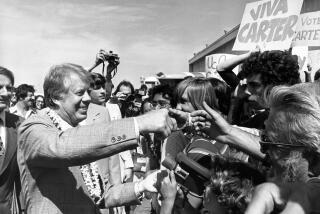Orval Faubus; Governor Blocked School Desegregation
- Share via
LITTLE ROCK, Ark. — Former Arkansas Gov. Orval E. Faubus, a onetime Ozark populist who became a national symbol of opposition to school desegregation, died Wednesday at his home in Conway, Ark. He was 84.
Faubus, who had a pacemaker installed in 1977, had suffered for years from heart and stomach problems. He also developed prostate cancer in 1991 and had radiation treatments.
Faubus became a national figure on Sept. 2, 1957, when he called out the Arkansas National Guard to keep nine black students from entering Little Rock’s all-white Central High School. That was three years after the Supreme Court had ruled that racially segregated public schools were unconstitutional.
The blacks were unable to enroll until President Dwight D. Eisenhower sent 1,000 paratroopers to Little Rock to enforce court integration orders.
“We are now an occupied territory,” Faubus said in an angry television speech. He charged that “Yankee soldiers” had held “naked, unsheathed bayonets in the backs of schoolgirls.”
Eisenhower kept the troops of the 101st Airborne Division at Central High until the end of the year. In the fall of 1958, Faubus retaliated and closed all of Little Rock’s high schools, permitting them to reopen the next year.
Although Faubus insisted that his only motive was to prevent violence, not to block integration, the moment he dispatched the National Guard to Central High he became a hero to segregationists and easily the most popular politician in Arkansas.
Calling out the Guard was later credited with making Faubus governor longer than anyone in Arkansas history, including President Clinton. Faubus was elected to an unprecedented six two-year terms.
Unlike Alabama Gov. George Wallace, Faubus never apologized for his actions in 1957.
“I’ve always said that I regret it ever happened,” Faubus told The Times in 1992. “But I would not change a thing because I was trying to stop property damage, injury or death. And in that, we succeeded.”
Faubus attempted to make a political comeback, running three times to try to regain the governor’s mansion. But when he lost to Clinton in the 1986 Democratic primary, he threw in the towel and declared himself “a has-been.”
Although he frequently criticized Clinton’s work as Arkansas governor, he refused to discuss Clinton’s presidency, saying only, “We’ve always had people in Arkansas who were capable of being President.”
Regarding integration in Little Rock, Faubus found himself playing an ironic role. The son of an old-time socialist, he had called himself a mountain populist when he first went into politics. Until the Little Rock incident, he had been regarded as a racial moderate who had presided over the integration of the state’s public colleges.
“I’ve been the most liberal governor in the South, but they can’t come in and cram (integration) down our throats,” Faubus said at a news conference during the height of the controversy.
“I was a victim of circumstance,” he said in 1992. “I offended the great federal government, and I’ve paid for it ever since.”
By 1958, when he was running for a third term, Faubus had polished an oratorical technique that soon was picked up by other Dixie politicians. His colorful speaking style proved adept at arousing crowds with charges that Northerners were pouring money into the state in an effort to defeat him.
“Why do they oppose me?” he would ask. His listeners would shake their heads angrily to show that they did not know either.
Faubus would then denounce the federal government, integrationists and “leftists” who, he said, were threatening the peace of the state. He was reelected with a majority vote in all 75 of the state’s counties. By the time Faubus had won his sixth term, he had defeated 25 opponents since he was first elected in 1954.
Orval Eugene Faubus was born in a log house in Combs, Ark., on Greasy Creek, on Jan. 7, 1910, and grew up in the Ozarks.
His father, J. S. (Sam) Faubus, was a socialist who was arrested by federal agents during World War I for opposing the draft and distributing “seditious literature.”
Sam Faubus raised his seven children to be liberals on the race issue. “He was opposed to bigotry,” Orval Faubus said of his father. “He was a supporter of women’s suffrage when it was unpopular.”
Although reared as a radical, Faubus never joined the Socialist Party.
“I looked the political situation over and I knew that as a socialist in those days you would be barred from any opportunity to hold office, state or otherwise,” Faubus said in an interview with The Times in 1982.
After a checkered career as a rural schoolteacher, county court clerk, country postmaster and publisher of a small weekly newspaper, Faubus entered the Democratic primary in 1954 against Gov. Francis A. Cherry, a former judge seeking a second term.
Faubus, then practically unknown, was given little chance of winning. But he was good looking and had an effective speaking style. And he got a big boost when the governor made a strategic mistake.
Cherry discovered that Faubus had once attended Commonwealth College at Mena, Ark., a labor school that had been started by socialists and was taken over by communists in the 1930s. Cherry made an issue of it.
Faubus said he had stayed at Commonwealth only a few weeks, departing when he concluded that it was too radical. Because it had happened 19 years earlier, many voters believed that Cherry had engaged in a cheap shot and rallied to Faubus’ support. He won.
Faubus compiled a progressive record during his first three years in office but remained comparatively unknown outside the South until the Little Rock school issue erupted.
He said later that the crisis would never have developed if prominent Little Rock citizens had not portrayed the integration plan for Central High as a model for the entire South. He said that mobilized the segregationists.
Faubus said he would rather be remembered for contributions to mental health and education. Under him, the state made big strides caring for the mentally ill, expanding its system of colleges and universities, raising teachers’ salaries, building roads and creating jobs through an industrialization program.
“That’s what I would like to be remembered for and I will when objective historians review the record,” he said. “It is not the fate of a controversial figure to be treated too kindly when he’s still here.”
Retiring from the governorship after his sixth term, Faubus and his wife, Alta, returned to their hometown of Huntsville in the Ozarks of northwestern Arkansas. Misfortune then began to dog him.
His wife of 37 years divorced him in 1969. He then married a 30-year-old woman, Elizabeth Westmoreland, who had once worked as his secretary. She was murdered in Houston where they lived briefly.
He is survived by his third wife, Jan Wittenburg, a Conway teacher 33 years his junior.
Seeking a comeback, Faubus ran for governor in 1970 and 1974. But he lost in the Democratic primaries, first to Dale Bumpers and then to David Pryor. Both became governors and later U.S. senators.
In 1976, Faubus’ only child, Farrell, committed suicide at age 37.
In need of money, Faubus wrote five books ranging from an account of his World War II experiences as an infantry officer in Europe to a eulogy to his dogs and a two-volume autobiography titled “Down From the Hills.” He peddled his books around the state, charging $10 a book, and an additional 10 cents if he autographed it.
Faubus also offered tours of his home in the Ozarks at $1.25 a head and worked briefly as a $5,000-a-year bank teller.
In 1981, Faubus went back on the public payroll when Republican Gov. Frank White made him director of the state Veterans Affairs Department. “I needed the job,” Faubus said.
In 1991, the state of Arkansas quietly accepted a bust of Faubus for display in the state Capitol, despite the fact that black legislators had protested such an honor.
Faubus’ body will lie in state in the Capitol’s rotunda in Little Rock today. A funeral is being planned for Saturday.
More to Read
Sign up for Essential California
The most important California stories and recommendations in your inbox every morning.
You may occasionally receive promotional content from the Los Angeles Times.













